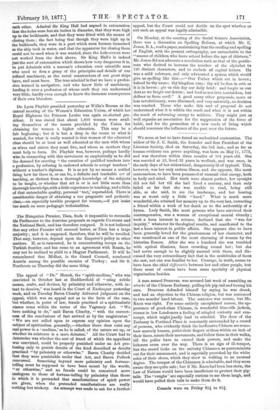On Monday, at the meeting of the Social Science Association,
there was a discussion on Spelling Reform, at which Mr. E. Jones, B.A., read a paper, maintaining that the reading and spelling of English, with the present orthography, are unteachable to the "masses of children who leave school before the age of thirteen." Mr. Jones did not advocate a revolution such as that of the gentle- man who desired to increase the number of the alphabet to 120 distinct characters, and to exclude all capital letters. He was a mild reformer, and only advocated a system which would give us spelling like this :—" Our Father which art in heven ; haloed be thy name ; thy kingdom cum ; thy wil be dun in erth as it is in heven ; giv us this day our daily bred ; and forgiv us our dets az we forgiv our deters; and leed us not intu temtaishon, but deliver us from eevil." A good many other proposals, more or less revolutionary, were discussed, and very naturally, no decision was reached. Those who make this sort of proposal do not understand what it is within the reach and what it is not within the reach of reforming energy to achieve. They might just as well organise an association for the suppression of the force of habit, and for the promotion of a new mode of living which should renounce the influence of the past over the future.


































 Previous page
Previous page